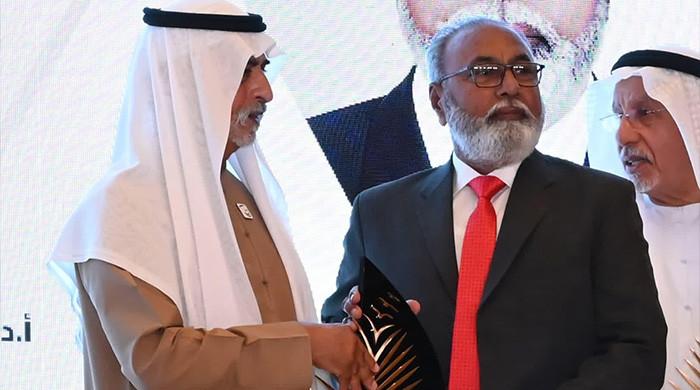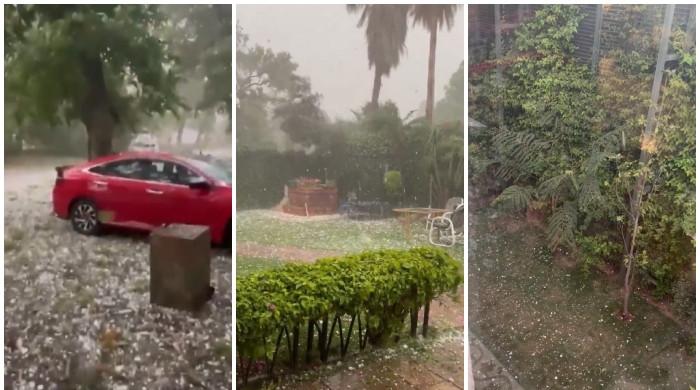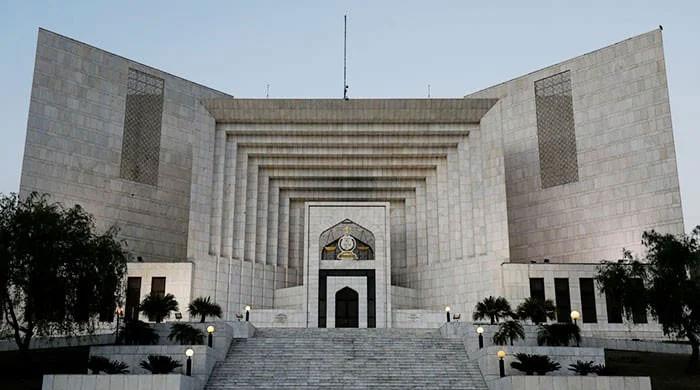Who’s drafting JIT reports?
Nobody knows who drafted the JIT's reports for submission before the Supreme Court and made members sign them
July 02, 2017
ISLAMABAD: A source related to banking, who has close association with one of the members of the Joint Investigation Team (JIT) probing the Panama Papers case, confirmed to this scribe that majority of the JIT members were not even given the time to go through the documents which were being submitted before the apex court by the JIT and they were only asked to sign them at the eleventh hour.
Not only this, documentary evidence and two latest proof surfaced have shown beyond an iota of doubt that even the controversial complaint filed by the JIT regarding obstructions being created in its functioning was not even read by the JIT members and they were made to sign it before its submission to the apex court. Nobody knows who drafted this for submission before the Supreme Court and made members of the JIT to sign it.
In its complaint before the apex court, the ‘JIT’ alleged that Securities and Exchange Commission of Pakistan (SECP) chairman ordered closure of an investigation into money laundering allegations against the Chaudhry Sugar Mills owned by the Sharif family. The ‘JIT’ complaint also alleged, “c. It is respectfully pointed out that the orders of the Chairman SECP to tamper the record and close Chaudhry Sugar Mills investigation of money laundering in back date, was executed by one Mr Ali Azeem Ikram, Executive Director, SECP. Incidentally, the said Ali Azeem Ikram was initially nominated by the SECP’ chairman so as to be a member of the present JIT. It seems that the nomination of said Mr Ali Azeem Ikram to be a member of the present JIT by the Chairman SECP had been made with a clear intent to subvert the investigation of the JIT.
“d. In the above context, one can now appreciate as to the backdrop in which the ‘WhatsApp call controversy’ was stirred at the behest of the Chairman SECP, attempting to unmeritedly drag the learned Registrar of this honourable court, when in actuality the learned Registrar, on his own volition, had no role in the matter.”
Now the investigation conducted by The News reveals that official record of SECP proves that it was not the SECP chairman but the whole commission which approved a list of officers for nomination in the JIT. The SECP was ordered by the Supreme Court to recommend three names for the JIT. One out of these three nominees was to be picked by the judges.
Interestingly, the first three names from the list approved by whole SECP commission and sent to the SC didn’t contain the name of the SECP officer “Ali Azeem Ikram”. More interesting is the fact that Bilal Rasul, who finally made his way to the JIT after WhatsApp call, was secretary to SECP. The official SECP record proves that in his capacity as secretary to the commission, Bilal Rasul, not only drafted the minutes of the meeting of the whole commission of SECP which approved the list of officers to be nominated for JIT but also signed the same minutes. The minutes of the said meeting with signatures of Bilal Rasul was also submitted to the Supreme Court.
The JIT complaint, signed by all the six members of the JIT, including Bilal Rasul, clearly alleged that Ali Azeem Ikram was initial nominee of the SECP chairman. Whereas the SECP correspondence with the apex court, still present in the SC record and can be examined by the honourable judges in the Implementation Bench, was sent with signatures of Bilal Rasul and never carried the name of Ali Azeem Ikram among the first three.
More interestingly, this issue of SECP is discussed on the very first page of the second of the JIT complaint filed with the apex court on June 12. This clearly shows that majority of the JIT members were not allowed to read even the first page of the JIT complaint and were only made to sign on Page-8.
This is a different story that later on Registrar’s Office of the SC wrote to the SECP to recommend two more names and someone called the SECP chairman using official landline number of the Office of the Registrar and advised the SECP chairman to attend a WhatsApp call. Later, the chairman received a call on Facetime, a mobile application, to receive secure and secret calls, and was asked to nominate Bilal Rasul for the JIT. The Facetime caller introduced himself as the Registrar Supreme Court of Pakistan. The name of Ali Azeem Ikram was at serial number 4 in the list of officers approved by the commission of SECP and name of one Yasir Manzoor was at serial number 5. As through official SC letter two more names were required, so as per the approval of the commission these two next names in the approved list were sent to the apex court while ignoring the secret WhatsApp call. The minutes of the meeting of the commission of SECP signed by Bilal Rasul were followed in letter and spirit.
The official record proves beyond any doubt that the initial recommendations from the SECP never contained the name of Ali Azeem Ikram as claimed in the JIT complaint and signed by Bilal Rasul.
The sources said that the JIT allegation that the SECP chairman ordered the closure of money laundering investigations in 2016 with the back date of 2013 has also been proved wrong as all those who submitted their statements before the Federal Investigation Authority (FIA) have admitted the basic fact that the investigations were closed in 2013. The sources said, and The News verified from the official record, that even those who are making allegations against the SECP chairman regarding putting a note on a file also admitted in their written statements that the investigation was closed back in 2013. The sources said that after proper closure of the investigation in 2013, not putting a note on the main file was a lapse on the part of some SECP officers and they put the back date to save their own skin and now making the allegation against the chairman. The SECP sources said that as the investigations were properly closed after submission of all required information by the Chaudhry Sugar Mills in 2013, putting a factually correct note on the file would have been no problem if the officers would have put the correct date of June 2016 when they were doing so. But they put the date of 2013 to correct their own mistake. The sources said that money laundering investigations were not even within the scope of the SECP and if someone has proof that money laundering was committed, he should come forward and conduct fresh investigations and punish whosoever is guilty.
The sources said that in the present case, it has been proved, and all the concerned officials agree, that there was no case of money laundering after detailed response from the Chaudhry Sugar Mills submitted along with all the evidences of export receipts from Japan, Korea, Taiwan, Malaysia, etc. Sources add that as far as the Panama case is concerned, one should be concerned with the money laundering allegation not with what happened within the SECP. If someone believes that money laundering was done, he should order impartial investigations into it. The sources asked as to how a lapse by some officials in the SECP can be made part of the whole episode, completely ignoring what the money laundering case was.
The second instance that proves the JIT is irrelevant to its reports submitted before the apex court is about the issue of leakage of the picture of Hussain Nawaz. For many, the leakage of the picture is not important but this very fact will be crucially important to them. The picture was leaked to the media and social media on June 4. On June 7, Hussain Nawaz moved an application before the SC to set up a commission to probe the leakage of his picture to humiliate him and his family prior to the appearance of Prime Minister Nawaz Sharif before the JIT.
On the day of filing Hussain’s application, the Implementation Bench questioned the JIT members about picture leakage issue in the courtroom and later ordered them to submit a reply/report on the issue. On June 12, the JIT submitted its response to Hussain’s application. This June 12 JIT response declared that after leakage of Hussain picture on June 4, the JIT started investigation on its own, identified the culprit, sent him back to his department and that the said “department” has also punished the said culprit. This June 12 response of the JIT to Hussain’s application also added another sentence according to which not only that this whole internal investigation of JIT into Hussain’s picture leakage issue was completed in a short time but also a report detailing all these findings and actions taken was submitted before the Implementation Bench of the SC within “24 hours and before even the filing of the application by Hussain Nawaz”.
It is important to mention that all the six JIT members had attended all the hearings of the Supreme Court till then, including the most important and crucial hearing of June 7 during which the judges asked the JIT to file a response to Hussain’s application. Had the complaint, filed by the JIT on June 12 and signed by all the six members, prepared or read by the JIT members, they must [would] have deleted the crucial sentence that the JIT has submitted its report to the Implementation Bench within 24 hours of the leakage and before even the filing of the application by Hussain Nawaz.
The person who prepared the complaint was unaware of the developments that took place in the courtroom on June 7 so wrote this sentence and the JIT members, who were not able to read even the first page, simply signed it.
This report was originally published in The News.











